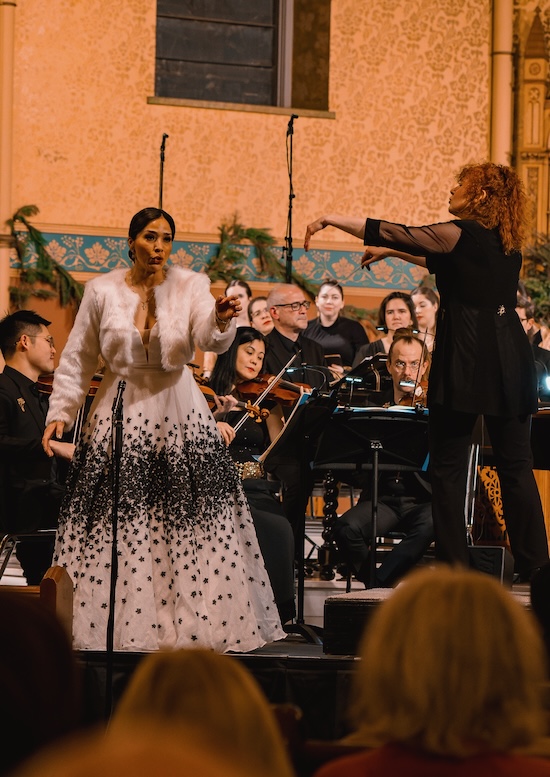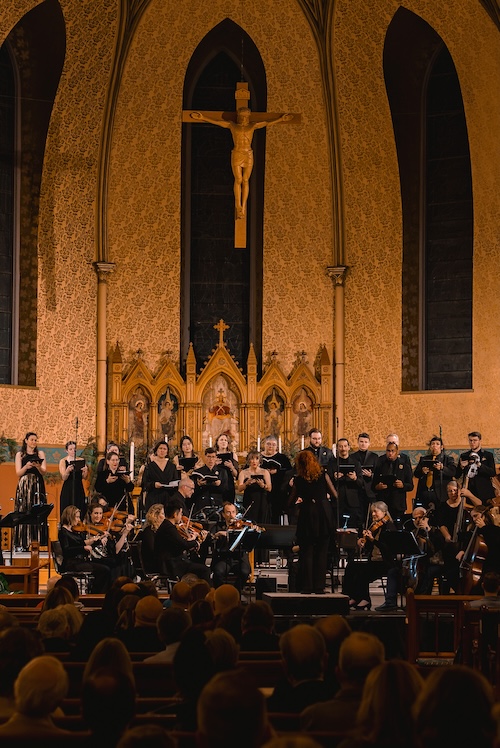Apollo’s Fire soloists provide transcendent moments in “Messiah”

On Sunday night, Apollo’s Fire rekindled its annual Messiah tradition presenting a performance of Handel’s oratorio to a capacity audience at St. James Cathedral.
Apollo’s Fire has enjoyed dual resident status in Chicago and its native Cleveland since 2021. Following worthy local entries of the Messiah in recent yuletide seasons, the venerable period instrument ensemble’s return marked an auspicious occasion for Chicago audiences.
With Apollo’s Fire artistic director Jeannette Sorrell at the helm, the ensemble again delivered on its promise of Handel performed with verve and panache. But while the orchestra and chorus were reliably good, and at times even exceptional, it was this program’s well-rounded and colorful variety of vocal soloists that delivered the transcendent moments on this occasion.
Part 1 served up a sampler of the evening’s vocal talents. Sonya Headlam’s rich, velvety soprano set the tone in “Comfort ye,” while “Ev’ry valley” showcased a penchant for dexterity and warmth in equal measure. By contrast, soprano Erica Schuller was buoyant and silvery in the rippling melismata of “Rejoice Greatly” and other such barnstormers, though her glowing incantations throughout the program proved equally enchanting.
Mezzo-soprano Guadalupe Paz was this roster’s secret weapon, with a throaty, amber-hued tone that, rather than cut through a hall, invited the audience to listen in. Her dark timbre paired with her deliberate pacing and elegant phrasing to great effect in “Then shall the eyes be opened,” and opposite Schuller in the duet “He shall feed his flock like a shepherd,” the pair were nothing short of luminous.

Though his contributions were brief, baritone Charles Wesley Evans brought a burnished, even-hued timbre to suit the quietly tense atmosphere of “For behold, darkness” and “The people that walked in darkness.” Edward Vogel, Evans’ baritone counterpart and one of the program’s undisputed standouts, melded power with limpid presence in “Thus saith the Lord” and “But who may abide.” His confidence in these roles was buttressed by the orchestra’s punchy yet flexible accompaniment, which under Sorrell’s attentive direction served up crisp articulation.
Those contrasts in color were further shaded by the chorus, whose cool and glassy precision in “And he shall purify” came as a salve to Vogel’s fire in the preceding selections. Such refreshing contrasts were among Sorrell’s directorial strong suits in this program, as was the keenly maintained balance between chorus, orchestra and soloists.
The orchestra and chorus offered some divine moments of their own, among them the clarion strains of “Glory to God.” Yet for all their vigor, the contributions of both the chorus and orchestra were marked by a certain lack of polish throughout the evening — a tentative entrance here, a spot of intonation issues there, and while modest in error, were frequent enough to distract.
Speaking of things that stuck out, tenor Jacob Perry, though technically on point and sweet of tone, brought an element of grit and theatrical swagger to “The rebuke hath broken his heart” and “He that dwelleth in heaven” that didn’t quite jell with the otherwise dignified style of the evening.
Part 2 ultimately yielded some of the program’s most interesting moments. After an uneven start, the Apollo’s Fire players snapped into gear for the reverential, organ-like coda of “All we, like sheep.” This haunting preface set the stage for a ballasted “He was despised” from Paz, which unfolded with all the patience and radiance of a blooming flower.
During “He trusted in God,” the soprano and bass members of the chorus descended from the stage to line the aisles. To keep eyes on all her players, Sorrell rotated on the podium like a carousel as the chorus, split between the stage and the audience, alternated their antiphonal declamations.
Indeed, the program was a workout for Sorrell, who stayed on her toes for all of it. Throughout the evening, the conductor kept a taut leash on tempos — which tended toward the brisk side, to the benefit of the program’s tight two hours of playing time — but never forfeited advocacy for either the soloists nor her band.
Those fleet-footed tempos, for all the vitality they imbued, occasionally came at the cost of clarity. In the second part, “All we like sheep” and “Let us break their bonds” shimmered from both the orchestra and chorus’ vibrant declamations, but the ribbons of notes occasionally lost their definition amid that sonic sheen.
One notable departure from the printed program: The tender violin-soprano duet “How beautiful are the feet,” exquisitely delivered here by Schuller and concertmaster Alan Choo, was relocated from Part 2 to the slot normally occupied by “If God be for us, who can be against us?” to offer a dose of contemplation ahead of the finale.
Its smattering of missteps aside, credit is due to Apollo’s Fire for having the Messiah hits locked down. Sorrell and her band delivering satisfying takes of the “Hallelujah” chorus, with a bravura that succeeded in keeping the audience on its feet in ovation, as well as “Worthy is the Lamb,” bookended by its florid and protracted final “Amen” that did the same.
Apollo’s Fire performs Handel’s Messiah at Saints Faith, Hope, & Charity Church in Winnetka 7:30 p.m. Monday. apollosfire.org
Posted in Performances


